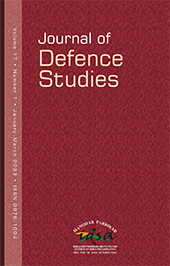Navigating ASEAN Centrality amidst Internal Friction and Interplay of Strategic Frameworks between the US and China
The principle of the Association of Southeast Asian Nations (ASEAN) centrality is embedded within the intricate dynamics of the broader Indo-Pacific region. This phenomenon can be attributed to the susceptibility of ASEAN’s centrality to various hegemonic processes. The article unveils challenges to ASEAN centrality arising from competing interests and alignment conflicts, particularly in relation to China and the United States (US). The emergence of strategic frameworks, coupled with China’s- Om Prakash Das |
- January-March 2024 |
- Journal of Defence Studies
India–Africa Defence Cooperation
- G.G. Dwivedi |
- July-September 2023 |
- Journal of Defence Studies





